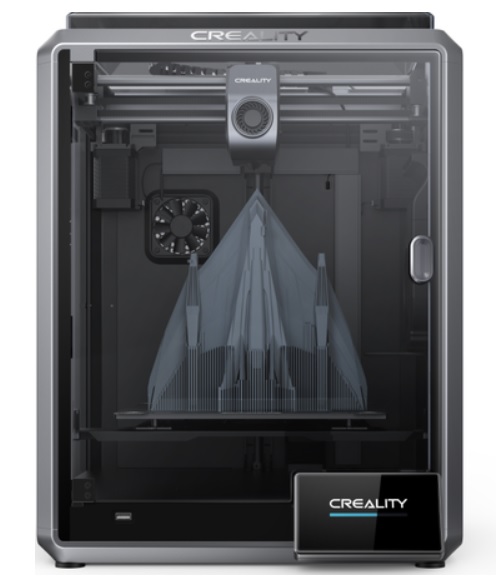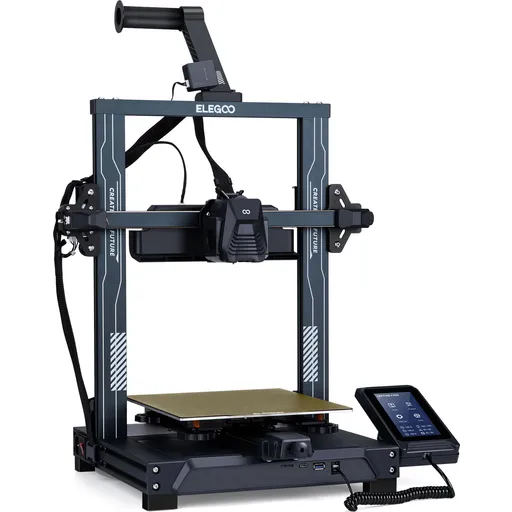Compare K1 vs Neptune 4 PRO
Comparison between the best 3D printers
Choose the best 3D printer at the best price. The cheapest 3D printers are here.
Buy a 3D printer here with 3D Fila.
 |
 |
|
| Model | K1[BUY K1] |
Neptune 4 PRO |
| Printing Material | Filament | Filament |
| Buy Filament for Creality 3D K1 | Buy Filament forElegoo Neptune 4 PRO | |
| Estimated price | $399,00 | $359,00 |
| Manufacturer | Creality 3D | Elegoo |
| Release Year | 2023 | 2023 |
| Print Volume [mm] | 220x220x250 | 225x225x265 |
| Printer Size [mm] | 355x355x480 | 475x445x515 |
| Weight [kg] | 12,5 | 8,9 |
| Power Loss Recovery | YES | YES |
| Enclosed printer | YES | NO |
| Bed Leveling | Automatic | Automatic |
| Filament End Sensor | YES | YES |
| Bed type | Heated | Heated |
| Power supply system | Direct Drive | Direct Drive |
| Standard nozzle | 0,4 | 0,4 |
| Maximum Nozzle Temperature [°C] | 300 | 300 |
| Maximum Bed Temperature [°C] | 120 | 110 |
| Maximum printing speed [mm/s] | 600 | 500 |
| Filament holder | YES | YES |
| Camera for supervision | YES | YES |
| Recommended filaments | ABS, PLA, PETG, PET, TPU, PA, ABS, ASA, PC, PLA-CF, PA-CF, PET-CF | PLA, PLA+, TPU, PETG, Nylon, ABS |
| Recommended slicers | Creality Print; Cura, Simplify3D e PrusaSlicer | Bambu Studio, Super Slicer, Cura, Prusa Slicer, Orca |
| Maximum Resolution [mm] | 0,1 | 0,1 |
| Processor | ARM 64 bit | |
| Display | Display touchscreen 4,3'' | Touchscreen 4,3'' |
| Power Supply | 110/220V / 350W | 310 W |
| Connectivity | Ethernet / USB / Wi-Fi | USB, microSD |
| Operating systems | Windows, Mac, Linux | Windows, Linux, Macbook |
| Date of registration in the system | 2023-04-17 | 2024-07-02 |
| Release date | 2023 | 2023 |
| Extra features | The K1 is an extremely fast FDM 3D printer, reaching 600mm/s, 12 times faster than standard models. Equipped with a Core XY system and lightweight print head, it offers energy efficiency and high print quality. It stands out for its dual-gear extruder and quickly heated hotend, as well as dual cooling to prevent warping. Its robust structure ensures stability at high speed, with optimized software to speed up the printing process. | The Elegoo Neptune 4 Pro stands out for its advanced features, including pre-installed Klipper firmware, a dual-gear direct extruder with a 5.2:1 ratio, a high-temperature nozzle (up to 300°C), a flexible magnetic PEI platform, efficient cooling fans, and a 121-point auto-leveling system. The printer also features a 4.3-inch touchscreen interface, dual linear bars on the X and Y axes, and a segmented heated bed for energy savings. |
| Support for multiple colors and materials (AMS and CFS) | NO | NO |
Notes * |
||
| Cost-benefit | 7 / 10 | 7 / 10 |
| Hardware | 4.2 / 10 | 2.8 / 10 |
| Tela | . | . |
| Print volume | 3 / 10 | 3 / 10 |
| Performance | 5 / 10 | 4 / 10 |
| [BUY K1] |
Conclusion |
| In comparing the Creality 3D K1 and the Elegoo Neptune 4 PRO, both 3D printers present compelling features suited for various users, yet they cater to slightly different needs and performance expectations. The Creality K1, although slightly more expensive, offers superior printing speed, reaching up to 600 mm/s, along with robust construction that ensures stability during high-speed operations. Its enclosed design enhances temperature control, which can be beneficial for printing with a wider range of materials. The dual-gear extruder and efficient cooling system contribute to its overall high performance and quality of prints, making it an excellent choice for users who prioritize speed and print quality. On the other hand, the Elegoo Neptune 4 PRO, while more budget-friendly, provides a solid range of features including advanced firmware and a comprehensive auto-leveling system. This printer is noted for its energy-efficient segmented heated bed and flexible build platform, which can enhance user experience. Although it has a slightly lower maximum print speed than the K1, it still supports a variety of filament types and offers a 3D printing experience with customizable features through the use of various slicing software. Ultimately, the choice between the two comes down to user priorities: those seeking unparalleled speed and build quality may gravitate towards the K1, while those looking for a reliable and cost-effective option with a focus on material versatility might prefer the Neptune 4 PRO. Both printers score similarly in cost-benefit assessments, revealing that either option represents a good investment in the realm of 3D printing. |

